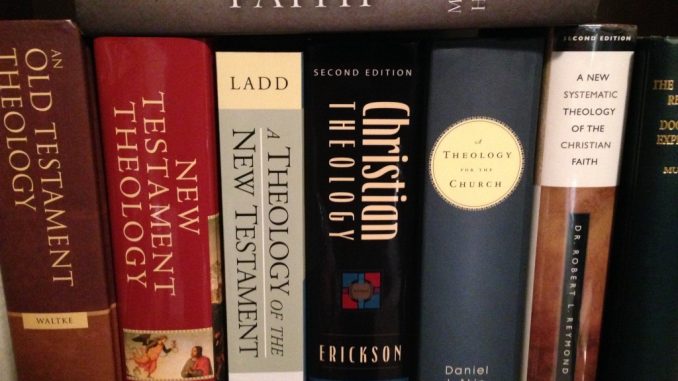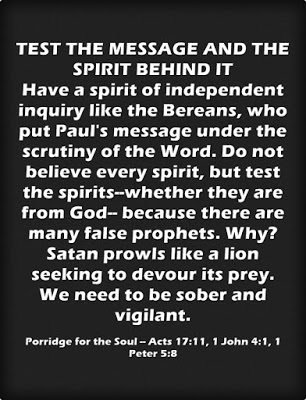
Should believers pursue sensational experience even if it goes against sound doctrine?
Some church leaders seem to support this premise: “Experientialism is the way to go; experience it and you will come to know the truth.”
Do you think the preceding statement is valid?
Is it true that the proof of the pudding is in the eating? Nothing like trying, isn’t it? Don’t we sing, O taste and see that the Lord is good?
Let me begin by saying that I have nothing against experiences and the miraculous realm, coming from a Pentecostal and Baptist background of more than 40 years.
But when teachers like Bill Johnson exalt the experience of signs and wonders to the extent that doctrine, scholarship and the use of one’s sound mind are all downplayed and even the deity of Christ is denied, red flags go up.
Are we so mesmerised by the miraculous and sensational that we are willing to depart from sound doctrine and whatever we hold dear in our faith?

For Bill Johnson and his followers, the presence of signs and wonders is more important than anything else—the more of the miraculous the better. http://goo.gl/z4WzZa
Should believers be willing to “go off the map”—go beyond what is found in the Word—in order to embrace the realm of the miraculous?
Johnson claims, “For decades the Church has been guilty of creating doctrine to justify their lack of power.”
He warns believers of the danger of embracing a “powerless Word”: “Those who feel safe because of their intellectual grasp of Scriptures enjoy a false sense of security. None of us has a full grasp of Scripture, but we all have the Holy Spirit. He is our common denominator who will always lead us into truth. But to follow Him, we must be willing to follow off the map—to go beyond what we know.”
The above (in blue) ** is an attempt by Johnson to denigrate scholarship and the Word to pave the way for believers to venture into the exciting realm of the miraculous.
Firstly, to set the Word against the Holy Spirit does not make sense. The Holy Spirit can only prompt believers to embrace the things found in the Word, not anything that is outside the confines of the Bible. After all, the Holy Spirit is the Spirit of Truth (John 16:13). And the Word is the Truth (John 17:17). Needless to say, we don’t have to set the Word against the Holy Spirit. How can we set one person of the Trinity against another person of the Trinity? Both work together to fulfill a common purpose. Most of the time, we can only know what the Holy Spirit is saying when we have a firm grasp of the Word.
In fact, Christians with a firm grasp of the Word should be more secure—not have a false sense of security as Johnson insinuates—for then they will be able to overcome deception. Those who do not emphasise the objective Word but depend on emotional highs and the leading of various spirits are more likely to falter and be deceived.
Secondly, the Bible is our “map”. To go “beyond what we know”, as asserted by Bill Johnson, is to go beyond the bounds of Scripture. When we denigrate the Word and exalt the realm of the supernatural, we no longer have any guide, compass or plumb line. We will be treading on uncharted territories. Whatever supernatural phenomena that we assume as originating from the Holy Spirit may not necessarily be so.
That’s dangerous and leaves us at the mercy of deception by diverse spirits. For deception goes hand in hand with the following: Letting our minds be on passive mode, setting aside discernment and downplaying of doctrine and scholarship. As such, believers will play into the hands of the devil if we adopt such a position.
Thirdly, every teacher claims that he or she stands for the truth. But how do we know the truth? Start with the objective Word. Study the whole Word. Be open to the Holy Spirit’s illumination. Learn know how to rightly handle the Word. And then within the constraints of the Word, be open to the workings of the Holy Spirit.
The apostle Paul emphasises the importance of sound doctrine which should be upheld at all costs. We need to hold fast to the Word, which must be preserved intact in its unadulterated form.

To imply that the Word should play a less important role in the believer’s life for the sake of greater supernatural experience—that we should be willing to be “led by the spirit” and follow “off the map” if we want to be more adventurous and venture into the realm of the miraculous—is another gospel.
-
Test all things; hold fast what is good (1 Thessalonians 5:21)
-
Watch your life and doctrine closely. Persevere in them, because if you do, you will save both yourself and your hearers. (1 Timothy 4:16)
-
Follow the pattern of the sound words that you have heard from me, in the faith and love that are in Christ Jesus. By the Holy Spirit who dwells within us, guard the good deposit entrusted to you. (2 Timothy 1: 13-14)
-
But as for you, continue in what you have learned and have firmly believed, knowing from whom you learned it. (2 Timothy 3: 14)
No, we must never go “off the map”—that is, entertain doctrines or practices that are beyond the sanction and bounds of the Word.
And all miracles or supernatural phenomena should be tested for authenticity against the Word.
Beloved, do not believe every spirit, but test the spirits to see whether they are from God, for many false prophets have gone out into the world.
(1 John 4:1)

REPENTANCE AND OBEDIENCE VS EMOTIONAL EXPERIENCES AND MANIFESTATIONS
What is the litmus test of an encounter with the living God?
“We know that the manifestations affect the emotions, but the Bible places much more emphasis on repentance (changed mind) and obedience (dedicated will) as the appropriate response to an encounter with the living God. The ultimate test of any experience is whether it leads to real repentance and observable obedience. This yardstick is especially necessary in an age which is addicted to novel experiences and regards all religious experiences as self-authenticating. The Church must not fall into this way of thinking but faithfully ‘test all thing’” – David Pawson
RELATED POSTS
TOUGH QUESTIONS FOR BETHEL FANS
Here are some searching questions for fans of Bill Johnson and Bethel church
SHOULD WE RUN AFTER SIGNS AND WONDERS?
Is there a rationale for pursuing signs and wonders?
Are the supernatural manifestations in church today invariably of divine origin?
The battle that has been raging for centuries: Should the believer emphasise the Word or Holy Spirit more? Some believers ground themselves so strongly in the Word that the Holy Spirit has little relevance in their lives. They become wary of spiritual gifts or “being led by the Spirit”, thinking that by doing so they may be opening themselves to self-deception and counterfeit spirits of darkness. So they reason it’s better to play it safe by staying in familiar territory.
Note: Dr Lim Poh Ann is a medical practitioner. He was the former editor of Asian Beacon magazine (Dec 2008 – Oct 2011). He can be reached at his Facebook page, www.facebook.com/AskDrLi
SOURCE OF ARTICLE: http://limpohann.blogspot.my/2015/10/experientialism-vs-doctrine.html
|Share The Good News|
Dr Lim Poh Ann




Leave a Reply